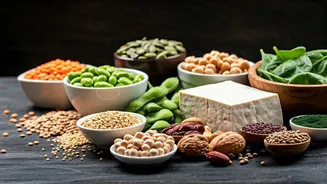Protein Powerhouses Revealed
Embarking on a journey to embrace plant-based protein means opening doors to a world of nutritional wonders. Plant-based protein sources offer a compelling
advantage over animal-based options by naturally providing an array of beneficial nutrients that go beyond protein. These sources are often richer in fiber, vitamins, and minerals, all while typically being lower in saturated fat and cholesterol. This is crucial for overall health, helping to support heart health, aid in digestion, and provide sustained energy levels. Focusing on a diet centered around plant-based protein promotes not only a healthier body but also enhances well-being. It encourages mindful eating and makes you more aware of the food you consume. Selecting a diverse selection of plant-based protein sources helps you to attain a balanced intake of all essential amino acids, which are the building blocks of protein. This ensures that you get all the nutrients required for muscle repair, growth, and optimal bodily function. Embracing these foods isn't just a trend; it's a commitment to a healthier lifestyle that's both sustainable and enjoyable.
Legumes: The Cornerstone
Legumes, which encompass lentils, chickpeas, and various types of beans, stand out as some of the most accessible and nutrient-dense sources of plant-based protein. These versatile foods are economical and readily available, making them a cornerstone of any health-conscious diet. Lentils, for instance, are quick-cooking and pack a substantial protein punch. They also bring a wealth of fiber to the table, aiding in digestion and helping you feel full longer, which is a great benefit for weight management. Chickpeas, also known as garbanzo beans, are a staple in many cuisines. They can be roasted for a crunchy snack, mashed into hummus, or added to salads and stews. Beans, whether they're kidney, black, or pinto, are similarly rich in protein and fiber, offering a variety of flavors and textures to diversify your meals. Including legumes in your diet does more than just meet protein requirements; it also contributes to overall gut health. The fiber they contain feeds beneficial gut bacteria, promoting a healthy microbiome. This, in turn, can improve immune function and reduce the risk of several chronic diseases. From hearty lentil soups to vibrant chickpea salads, incorporating legumes is a delicious and straightforward method to improve both your diet and well-being.
Soy: A Complete Protein
Soy stands out in the plant-based protein world because it is a complete protein, meaning it contains all nine essential amino acids that our bodies cannot produce on their own. Soybeans, tofu, tempeh, and edamame all provide a substantial amount of protein, making them excellent choices for those looking to build or maintain muscle mass. Tofu, often called bean curd, is incredibly adaptable. Its ability to absorb the flavors of marinades and seasonings makes it a versatile ingredient in many dishes. Tempeh, a fermented soybean product, has a firmer texture and a slightly nutty flavor, perfect for stir-fries and sandwiches. Edamame, young soybeans, can be eaten as a snack or added to salads and side dishes. Soy products are also rich in other essential nutrients, like iron, which is particularly beneficial for those following plant-based diets. Furthermore, soy has been linked to several health benefits, including improved heart health and reduced risk of certain cancers. However, it's essential to select organic and non-GMO soy products to ensure the consumption of the healthiest possible options. Moderation and a balanced diet are key to reaping the benefits of soy and avoiding any potential concerns.
Nuts and Seeds Abound
Nuts and seeds are not just tasty snacks; they are nutritional powerhouses packed with protein, healthy fats, and essential minerals. Almonds, for example, offer a good dose of protein and are rich in vitamin E, a potent antioxidant. Walnuts provide protein and are a great source of omega-3 fatty acids, which are beneficial for brain health and heart function. Cashews, another popular choice, offer a creamy texture and are rich in magnesium, crucial for maintaining bone health and muscle function. Seeds such as chia seeds and flax seeds are also excellent sources of protein and fiber. Chia seeds are a complete protein source, and both types of seeds are packed with omega-3 fatty acids. They also contribute to a feeling of fullness, which can aid in weight management. Hemp seeds are another fantastic choice, offering a complete protein profile, along with omega-3 and omega-6 fatty acids, along with important minerals. Pumpkin seeds and sunflower seeds also provide protein and essential nutrients. Incorporating a variety of nuts and seeds into your diet not only increases your protein intake but also adds flavor, texture, and a variety of essential nutrients. Enjoy them as snacks, add them to your salads and smoothies, or incorporate them into your cooking to reap their numerous health benefits.
Grains: Hidden Proteins
Many grains provide more protein than most people realize, making them valuable additions to a plant-based diet. Quinoa, often described as a pseudo-grain, is a complete protein source, providing all nine essential amino acids. It is also gluten-free and easy to cook, making it a great option for people with dietary restrictions. Oats, a breakfast staple, also offer a good amount of protein, along with soluble fiber that aids in heart health and digestion. Whole-grain bread and pasta provide more protein than their refined counterparts. They also offer fiber and other essential nutrients. Brown rice is another good source of protein and is more nutritious than white rice. Choosing whole grains over refined grains ensures that you get the most nutritional value from your meals. Grains offer more than just protein. They also contribute complex carbohydrates, which provide sustained energy, and various vitamins and minerals, promoting overall health. Integrating a variety of grains into your meals is an easy and delicious method to boost your protein intake while enjoying diverse flavors and textures. From breakfast porridge to dinner pilafs, whole grains offer flexibility for satisfying and healthy eating.
Vegetables: Protein Surprises
Certain vegetables, though often overlooked as protein sources, contribute a surprising amount to your daily intake. Spinach, for instance, contains a good dose of protein and is packed with other essential nutrients like iron and vitamins. Broccoli is another protein-rich vegetable, and it’s a nutritional powerhouse loaded with fiber and vitamins. Asparagus and mushrooms also provide decent amounts of protein. Including a variety of vegetables in your diet not only increases your protein consumption but also provides an array of vitamins, minerals, and antioxidants. These nutrients are essential for promoting overall health and supporting various bodily functions. While vegetables may not be as protein-dense as legumes or soy, they play a vital role in a balanced diet. Incorporating colorful and varied vegetables into your meals boosts your nutrient intake and improves the taste. Think of them as complements to your protein-rich staple foods, such as beans or grains. Enjoying a wide range of vegetables makes your meals more vibrant, nutritious, and appealing. Therefore, don't overlook vegetables as a meaningful contribution to your daily protein needs; they are essential for overall health.
Spirulina and Nutritional Yeast
Spirulina and nutritional yeast are unique and highly nutritious additions to any plant-based diet. Spirulina, a blue-green algae, is an extremely nutrient-dense food, providing substantial amounts of protein, vitamins, and minerals. It is a complete protein and is easy to add to smoothies and juices. Nutritional yeast, often called 'nooch,' is a deactivated yeast that has a cheesy flavor and is a great source of protein, B vitamins, and trace minerals. It is a particularly good source of vitamin B12, which is often lacking in plant-based diets. Nutritional yeast can be sprinkled on popcorn, added to sauces, or used to make vegan 'cheese' sauces. These ingredients are not only nutritious but also offer exciting ways to add flavor and variety to your meals. Adding spirulina or nutritional yeast to your recipes significantly increases the nutritional value and provides benefits. They are particularly valuable for people following plant-based diets as they help them meet specific nutritional requirements. From adding a protein boost to your morning smoothie with spirulina to creating creamy, flavorful sauces with nutritional yeast, you can easily include these nutrient-rich ingredients in your diet and enjoy their health benefits.
Plant-Based Protein Integration
Incorporating plant-based protein into your diet is a simple process that can be tailored to your preferences and needs. Start by planning meals around protein-rich ingredients. Try including legumes like lentils or chickpeas in your soups and stews. Use tofu or tempeh as meat alternatives in stir-fries, sandwiches, and salads. Add nuts and seeds to your breakfast cereals, oatmeal, or snacks to increase both protein and nutrients. Incorporate quinoa or brown rice as the base for your main meals. Ensure you are getting a variety of foods to meet all your essential amino acid needs. Mix and match different protein sources to obtain a complete protein profile. Preparing meals in advance can make it easier to stick to your dietary goals, so consider meal prepping. Preparing large batches of lentils, grains, or roasted vegetables can save time and energy during the week. Additionally, there are many recipes available online and in cookbooks. These sources can provide inspiration and ideas for using different plant-based proteins in exciting ways. Experiment with different recipes and combinations to discover new favorites and enjoy the diversity that plant-based protein has to offer. Make it a lifestyle, and celebrate the benefits of a diet rich in plant-based protein.
Benefits and Sustainability
Embracing plant-based proteins extends beyond personal health; it also has a significant impact on environmental sustainability. Plant-based diets generally require fewer resources to produce compared to animal-based diets. This means they contribute to a smaller environmental footprint, reducing the demand for land, water, and energy. Furthermore, plant-based agriculture often has a lower impact on greenhouse gas emissions, assisting in the fight against climate change. Selecting plant-based protein sources helps lower the risk of various health conditions, including heart disease and certain cancers, due to their typically lower saturated fat and cholesterol content. Plant-based diets can also improve your digestive health due to their high fiber content, which promotes healthy gut bacteria. Adopting plant-based eating patterns promotes not only a healthier you but also a more sustainable world. This shift can play a crucial role in conserving our planet's resources. Eating a diet centered on plant-based proteins is a win-win, offering health benefits and promoting environmental responsibility. It’s a chance to make a positive impact on both your well-being and the planet’s future.
Conclusion: A Healthier Future
Transitioning to a diet that incorporates more plant-based protein is a positive step toward better health and a more sustainable lifestyle. By exploring the 25 various plant-based protein sources discussed in this guide, you have the knowledge and tools to create delicious, satisfying, and nutritious meals. Whether you choose legumes, soy products, nuts, seeds, grains, vegetables, or unique additions like spirulina and nutritional yeast, there are countless ways to incorporate these nutrient-rich foods into your daily routine. Remember to experiment with new recipes, try different flavors, and find the combinations that best suit your tastes and dietary needs. By embracing plant-based proteins, you not only fuel your body with essential nutrients but also support a healthier planet. This is a journey that promotes both personal wellness and global sustainability. So, begin today, experiment, and enjoy the many benefits that come with a protein-rich, plant-based diet. Your body, mind, and the environment will thank you.




















